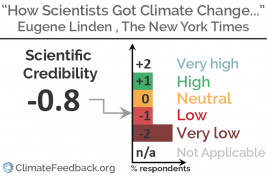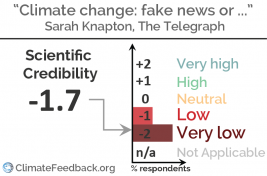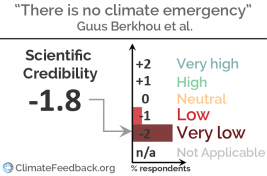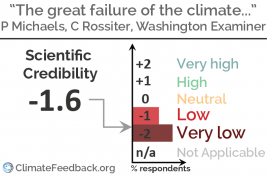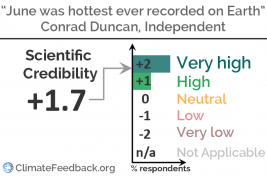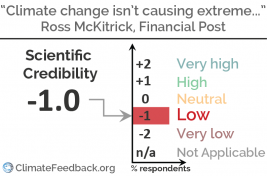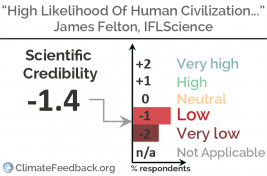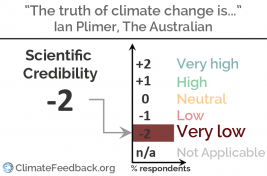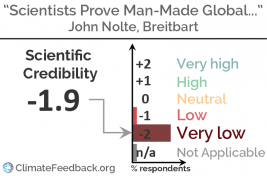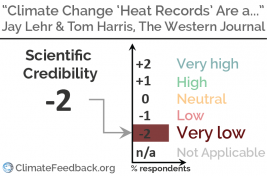Article Reviews
“Is this article consistent with the latest thinking and knowledge in science?”
“Would experts in this field endorse the main message of this article?”
These are the types of questions our “feedbacks” are designed to answer. If the feedback is positive, you can generally assume the information you’re reading is of high credibility. If it’s negative, however, you may want to read with extra care and attention — some of the information contained and conclusions reached are not consistent with science.[1]
New York Times op-ed claiming scientists underestimated climate change lacks supporting evidence
in The New York Times, by Eugene Linden
"Most of the specific facts and statistics in this op-ed are correct, but the overall effect is significantly misleading. The author’s central point is that scientists have been drastically underestimating the scope and the pace of climate change until just the past decade or so, and recent events such as permafrost melting, ice cap loss, and extreme weather events have caught them by surprise. This is simply not true."
— 18 Nov 2019
Telegraph article on climate change mixes accurate and unsupported, inaccurate claims, misleads with false balance
in The Telegraph, by Sarah Knapton
"This article is a prime example of false equivalence, putting fringe figures side by side with mainstream scientific findings while failing to distinguish between their respective credibility. It is rife with numerous factual errors and misrepresentations. Anyone unfortunate enough to read it will understand less of the science – as actually appears in peer-reviewed publications and conferences – not more."
— 18 Oct 2019
Letter signed by “500 scientists” relies on inaccurate claims about climate science
in clintel.nl, by Guus Berkhout, Reynald du Berger, Terry Dunleavy, Viv Forbes, Jeffrey Fos, Morten Jodal, Rob Lemeire, Richard Lindzen, Ingemar Nordin, Jim O'Brien, Alberto Prestininzi, Benoit Rittaud, Fritz Vahrenholt, Christopher Monckton
"The scientific content is completely inaccurate, undocumented, and fails to bring proof for its claims. The ending of the Little Ice Age in 1850 has no logical link with the fact that the Earth is warming now. Most past climate variations have been slower or less intense as the present one, and if they were as fast or severe they brought about mass extinctions in the biosphere. No explanation or proof is brought on the implausibility or inaccuracy of climate models (whose accuracy or uncertainty is precisely quantified and makes their use better than just random guesses)."
— 04 Oct 2019
Washington Examiner op-ed cherry-picks data and misleads readers about climate models
in The Washington Examiner, by Patrick Michaels, Caleb Stewart Rossiter
"This article focuses only on specific lines of evidence that climate models disagree with observations. In doing so, the authors ignore research that helps to reconcile differences between models and observations. The authors do not consider alternate datasets and time periods in which models and observations agree. Models are one tool for understanding climate change; their overall credibility does not hinge on one variable, in one domain, over a specific time period, with respect to a set of imperfect observations."
— 31 Aug 2019
Popular article in The Independent accurately summarizes June heat in Europe
in The Independent, by Conrad Duncan
"The article accurately and clearly states the facts regarding the recent extreme heat in June 2019 and its link to anthropogenic warming. This includes acknowledging that, at this point, this June record and its connection to climate change is based on only a single temperature product and one attribution study, and that further analysis may slightly change the initial conclusions drawn by researchers."
— 05 Jul 2019
Financial Post commentary jumps to unsupported conclusions in claiming “climate change isn’t causing extreme weather”
in Financial Post, by Ross McKitrick
"This article is misleading since it confuses changes in climate change impacts with changes in climate and weather extremes and it subjectively selects examples that support its message. There is clear scientific evidence that many weather and climate extreme events increase in intensity and frequency due to anthropogenic climate change. Munich Re, for example, publishes data on global major extreme events in its annual reports."
— 13 Jun 2019
Claim that human civilization could end in 30 years is speculative, not supported with evidence
in IFLScience, by James Felton
"The report this article is based on describes a scenario which is unlikely, but several aspects of what is included in the report are likely to worsen in coming decades, such as the occurrence of deadly heatwaves. The conclusion of a high likelihood that human civilisation will end is false, although there is a great deal of evidence that there will be many damaging consequences to continued global warming over the coming decades."
— 09 Jun 2019
Commentary in The Australian by Ian Plimer relies on false claims to make its case
in The Australian, by Ian Plimer
"If you think that potentially causing hundreds of millions of refugees and trillions of dollars in damages is fine because some plants did well in the same conditions millions of years ago when humans weren’t around, then you could support this article."
— 20 May 2019
Breitbart article baselessly claims a study of past climate invalidates human-caused climate change
in Breitbart, by John Nolte
"By the reasoning of this article, if a rock rolled down a hill three million years ago, no human can be responsible for rolling a rock down a hill today. The fallaciousness of this reasoning is astounding. It is hard to imagine that a well-intentioned person can so profoundly misunderstand the science. Assuming the author is acting in good faith, this article provides evidence that motivated reasoning can produce results that appear delusional to well-informed people."
— 11 Apr 2019
Western Journal op-ed deceives readers with completely unsupported claims
in The Western Journal, by Jay Lehr, Tom Harris
"What would make their case stronger would be if they actually analysed all the data, engaged with the existing scientific literature and made their own contribution to our scientific understanding by publishing a scientific paper. The cherry picking exercise in this Western Journal article does not contribute to our scientific understanding of the world."
— 26 Feb 2019
[1] Note: These feedbacks do not constitute endorsements of the author’s political or economic ideology, rather they are assessments of the scientific foundations and reasoning of the argumentation contained within each article.

